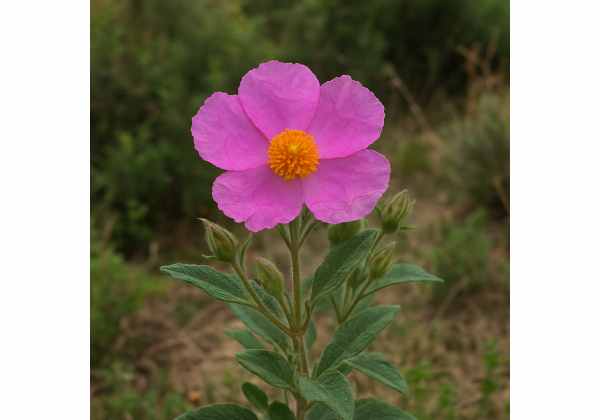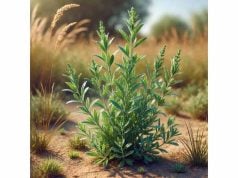
Rock Rose is a time-honored herb renowned for its striking, papery blossoms and robust, earthy aroma. Celebrated for its potent health benefits, this herb is packed with diverse active compounds that work together to deliver impressive antioxidant, anti-inflammatory, and antimicrobial effects. Used traditionally to soothe skin irritations, promote wound healing, and bolster the immune system, Rock Rose has long held a prominent place in herbal medicine. Its versatility extends from medicinal preparations and cosmetic applications to culinary infusions. Modern science is now beginning to validate these historical uses, reinforcing its reputation as an invaluable natural remedy for holistic wellbeing.
Table of Contents
- Distinct Botanical Profile and Morphological Identification
- Phytochemical Spectrum and Vital Constituents
- Robust Health Benefits and Therapeutic Attributes
- Diverse Applications and Practical Safety Guidelines
- Innovative Research and Significant Study Insights
- Commonly Asked Questions and Clear Responses
Distinct Botanical Profile and Morphological Identification
Rock Rose, botanically classified within the Cistaceae family and most frequently associated with the genus Cistus, is an evergreen shrub that thrives in rocky, sun-drenched landscapes. This resilient plant exhibits an attractive, shrubby habit with woody stems that create a rugged, ornamental appearance. Its leaves are typically gray-green, leathery, and slightly wrinkled, adapted to conserve moisture in arid conditions. The delicate, crinkled petals of its flowers, which vary in hue from creamy white to deep pink or purple, unfurl during warm seasons, imparting a dramatic splash of color against the rough terrain.
Native to the Mediterranean basin and other warm, dry regions, Rock Rose is well-suited to rocky outcrops, limestone soils, and areas with minimal rainfall. This herb’s innate adaptability enables it to flourish even in nutrient-poor soils and under harsh climatic conditions. Its extensive root system is designed to seek out scarce water reserves, ensuring survival during prolonged dry spells. In its natural habitat, Rock Rose acts as both a stabilizer of fragile soils and an essential component of local ecosystems, where it provides shelter and sustenance for a range of pollinators and small wildlife.
The morphology of Rock Rose is as fascinating as its environmental resilience. The plant’s leaves are arranged in a manner that minimizes water loss while maximizing light capture, a crucial adaptation to its xeric surroundings. The flowers, often clustered at the tips of branches, are not only visually appealing but also serve a functional role in attracting insects for pollination. This mutualistic relationship with pollinators enhances the plant’s reproductive success and ensures genetic diversity within populations. Beyond its ornamental value, Rock Rose is prized for its aromatic oils, which are extracted from the leaves and blossoms and have been used in traditional remedies and perfumery for centuries.
Historically, the plant has been integrated into herbal practices across various cultures. Ancient texts and folk medicine traditions attest to its utility in treating a range of ailments—from respiratory issues and skin infections to digestive disturbances. Its sturdy nature and the ease with which it can be propagated have made Rock Rose a favorite among herbalists and gardeners alike. Modern botanical studies continue to explore the species’ genetic variability, revealing subtle differences in leaf texture, flower morphology, and essential oil composition that have implications for both cultivation and therapeutic application.
In summary, the unique botanical traits of Rock Rose not only contribute to its survival and ecological role but also underpin its extensive use in natural medicine. The plant’s morphological adaptations—its drought-tolerant leaves, vibrant flowers, and robust root system—reflect an evolutionary mastery of life in challenging conditions. These features, in turn, contribute to the potency of its bioactive compounds, which are instrumental in delivering its many health benefits. Whether admired for its natural beauty in wild landscapes or harnessed for its healing properties in herbal formulations, Rock Rose remains a symbol of nature’s enduring resilience and multifaceted value.
Phytochemical Spectrum and Vital Constituents
The therapeutic efficacy of Rock Rose is deeply rooted in its complex phytochemical profile. Modern analytical techniques have unveiled a diverse array of bioactive compounds, which together contribute to the herb’s impressive medicinal properties. The following key constituents underscore its multifaceted biological activity:
- Polyphenols and Flavonoids:
Rock Rose is particularly rich in polyphenolic compounds, including a variety of flavonoids such as quercetin, kaempferol, and myricetin. These antioxidants are critical for neutralizing free radicals and protecting cells from oxidative stress. Their anti-inflammatory actions also contribute significantly to alleviating chronic inflammatory conditions and supporting cardiovascular health. - Tannins:
Tannins present in Rock Rose exhibit strong astringent properties, which help in tightening and toning tissues. They are instrumental in wound healing and in reducing the risk of infection by limiting the availability of nutrients to pathogenic microorganisms. Their presence also imparts a protective effect against gastrointestinal disturbances. - Essential Oils:
The volatile oils extracted from Rock Rose are a potent blend of monoterpenes and sesquiterpenes, including compounds like α-pinene, limonene, and borneol. These components are known for their antiseptic, anti-inflammatory, and analgesic properties. The essential oils not only contribute to the herb’s distinctive aroma but also enhance its therapeutic efficacy in topical and inhalation applications. - Cistus Lactone Derivatives:
Unique to the Cistus species are certain labdane-type diterpenes that exhibit antimicrobial and antioxidant effects. These compounds play a crucial role in mediating the herb’s ability to modulate immune responses and protect against microbial infections. - Rosmarinic Acid:
Also found in other aromatic herbs, rosmarinic acid in Rock Rose contributes significantly to its antioxidant capacity. This compound has been associated with a reduction in oxidative stress and has demonstrated anti-allergic and anti-inflammatory activities, making it valuable in managing conditions such as asthma and dermatitis. - Vitamin C and Other Micronutrients:
Trace amounts of vitamin C, along with other minerals and micronutrients, are naturally present in Rock Rose. These nutrients further support the herb’s antioxidant profile and contribute to skin health, immune function, and overall cellular repair processes.
The synergy among these compounds is what imparts Rock Rose with its robust healing powers. Each constituent not only exerts its individual effect but also enhances the performance of other bioactives, resulting in a holistic therapeutic effect. Traditional herbalists have long relied on the entire spectrum of these phytochemicals rather than isolated extracts, a practice that modern research suggests is key to harnessing the full potential of the herb.
Advanced extraction methods, including steam distillation and cold pressing, are employed to preserve the integrity of these delicate compounds. The extraction process significantly influences the quality and concentration of the active ingredients, ensuring that the resulting formulations maintain their purported benefits. As research progresses, the importance of maintaining the natural balance of these constituents becomes increasingly apparent, further validating the traditional methods of whole-herb usage.
The phytochemical richness of Rock Rose is being continually investigated, with ongoing studies aiming to better understand the molecular mechanisms behind its health-promoting properties. Early findings indicate that its antioxidant and antimicrobial effects may even have applications in modern integrative medicine, ranging from the development of novel cosmetic products to natural therapeutic agents for chronic diseases.
In summary, the diverse spectrum of phytochemicals found in Rock Rose lays the foundation for its wide-ranging medicinal properties. By integrating antioxidants, essential oils, tannins, and unique diterpenes, this herb offers a natural, multifactorial approach to promoting health and combating disease. This intricate web of active constituents is at the heart of its enduring reputation as a formidable natural remedy.
Robust Health Benefits and Therapeutic Attributes
Rock Rose is celebrated not only for its captivating appearance but also for its extensive range of health benefits. The herb’s medicinal properties, largely driven by its rich phytochemical composition, have made it a staple in traditional healing practices and are increasingly supported by modern scientific research. The following therapeutic attributes exemplify the remarkable health benefits of this herb:
Antioxidant Activity:
The high concentration of polyphenols, flavonoids, and rosmarinic acid empowers Rock Rose to effectively scavenge harmful free radicals. This antioxidant activity is crucial for reducing oxidative stress, a key factor in the development of chronic illnesses such as cardiovascular diseases, diabetes, and neurodegenerative disorders.
Anti-inflammatory Effects:
Inflammation is at the root of many chronic conditions, and Rock Rose offers a natural solution. Its bioactive compounds, including tannins and essential oils, actively reduce inflammatory mediators. This anti-inflammatory property may help alleviate symptoms associated with arthritis, skin conditions, and inflammatory bowel disease.
Antimicrobial and Antiviral Properties:
Rock Rose has been traditionally used to treat infections, owing to its potent antimicrobial constituents. Studies have shown that the essential oils, particularly those containing α-pinene and borneol, can inhibit the growth of various bacteria and fungi. This makes the herb an excellent natural remedy for minor skin infections, respiratory ailments, and even dental issues.
Wound Healing and Skin Regeneration:
The astringent nature of tannins and the anti-inflammatory properties of the herb contribute to rapid wound healing. Rock Rose is frequently incorporated into topical formulations to treat cuts, burns, and skin irritations. By promoting collagen synthesis and enhancing tissue repair, it supports the overall regeneration of the skin.
Digestive and Gastrointestinal Support:
Traditionally, Rock Rose has been utilized as a digestive tonic. Its compounds help in soothing the gastrointestinal tract, reducing spasms, and promoting a balanced gut environment. The herb’s mild astringency aids in managing diarrhea and other minor digestive disturbances, while its antioxidant properties protect the lining of the gut.
Respiratory Relief:
Inhalation of Rock Rose essential oil, either directly or as a component of steam therapies, can help clear respiratory congestion. Its expectorant action facilitates the expulsion of mucus, thereby alleviating symptoms of colds, bronchitis, and sinusitis. This makes it particularly useful during seasonal outbreaks of respiratory infections.
Immune System Support:
The multifaceted action of Rock Rose’s phytochemicals helps modulate immune responses. By reducing inflammation and combating oxidative stress, the herb supports the body’s natural defenses, making it a valuable ally in maintaining overall immune health and resilience against infections.
Stress Relief and Mental Clarity:
A less frequently highlighted benefit, yet equally important, is Rock Rose’s capacity to promote mental wellbeing. The calming effects of its volatile oils contribute to stress reduction and enhanced mental clarity. This soothing property is often exploited in aromatherapy practices aimed at alleviating anxiety and improving mood.
Furthermore, the holistic benefits of Rock Rose appear to be enhanced when the herb is used in its whole form. Traditional preparations that incorporate the full spectrum of its constituents are believed to deliver synergistic effects that far exceed those observed with isolated extracts. Its versatility means that small doses, whether ingested or applied topically, can yield significant improvements in both physical and emotional health.
By integrating Rock Rose into daily wellness practices—whether as part of a tea, a tincture, or a topical application—users may enjoy improved antioxidant defenses, reduced inflammation, and a more balanced immune system. Its comprehensive benefits underscore the herb’s role as a cornerstone in natural medicine, blending ancient wisdom with modern scientific validation to create an effective approach to holistic health.
Diverse Applications and Practical Safety Guidelines
Rock Rose is not only a powerhouse of therapeutic benefits; it also boasts a wide variety of applications that make it a versatile addition to any natural health regimen. Its traditional uses have evolved over time, and today it is appreciated for its culinary, medicinal, and cosmetic applications. Below is a detailed look at how Rock Rose can be utilized in various forms, along with essential guidelines for safe usage.
Culinary Applications:
- Herbal Infusions and Teas:
Rock Rose is often brewed as a tea to harness its soothing effects on the digestive and respiratory systems. A simple infusion of dried leaves and petals in boiling water allows the beneficial compounds to be extracted. This tea is popular not only for its health-promoting properties but also for its delicate, subtly aromatic flavor profile. - Flavor Enhancer in Cooking:
The herb’s unique, slightly resinous taste makes it a valuable ingredient in gourmet recipes. It can be used to infuse oils, vinegars, and marinades, adding a depth of flavor to salads, sauces, and roasted dishes. Chefs often experiment with small quantities to complement a variety of cuisines, ranging from Mediterranean to modern fusion dishes.
Medicinal Preparations:
- Tinctures and Extracts:
Concentrated Rock Rose tinctures are available and can be taken in small, controlled doses to deliver targeted health benefits. These extracts are particularly useful for individuals seeking a potent dose of its active compounds, such as antioxidants and anti-inflammatory agents. Always follow manufacturer guidelines or consult with a healthcare professional regarding dosage. - Topical Formulations:
Due to its antimicrobial and wound-healing properties, Rock Rose is commonly incorporated into creams, ointments, and salves. When applied topically, it can help manage skin irritations, minor burns, and abrasions. For best results, the extract should be diluted with a carrier oil to prevent any potential skin irritation. - Aromatherapy Products:
The essential oil of Rock Rose is prized in aromatherapy for its calming and revitalizing scent. Diffusing the oil or using it in steam inhalation can offer respiratory relief and help ease stress. Its volatile compounds are easily absorbed through the lungs, making it an effective natural remedy for clearing congestion.
Cosmetic and Personal Care Uses:
- Skincare Enhancements:
Rock Rose extracts are increasingly being integrated into skincare formulations. Thanks to their antioxidant and anti-inflammatory properties, these extracts help combat signs of aging, reduce redness, and promote overall skin health. Products such as facial creams, serums, and masks often feature the herb as a key ingredient to enhance hydration and elasticity. - Hair Care Benefits:
In hair care, Rock Rose is used to invigorate the scalp and stimulate blood circulation. Shampoos and conditioners containing the herb’s extract can help reduce scalp irritation and promote healthier hair growth. The natural astringency of the herb also helps cleanse the scalp by removing excess oils and impurities.
Dosage and Preparation Recommendations:
- Herbal Tea:
Steep one teaspoon of dried Rock Rose leaves and petals in a cup of boiling water for 5–10 minutes. This preparation is gentle enough for daily consumption and is commonly used to support digestion and relaxation. - Tincture Usage:
If using a tincture, a typical dosage might range from 10 to 20 drops diluted in water or tea, taken once or twice daily. However, individual dosages may vary based on age, health status, and specific therapeutic goals; consulting with a healthcare provider is advisable. - Topical Applications:
For skin applications, mix a few drops of Rock Rose essential oil with a carrier oil, such as coconut or jojoba oil, and apply to the affected area up to twice a day. Always perform a patch test to ensure no allergic reaction occurs.
Safety Considerations and Precautions:
- Allergies and Sensitivity:
Although Rock Rose is generally considered safe for most users, those with sensitive skin or known allergies to similar aromatic herbs should exercise caution. Discontinue use if irritation or allergic reactions develop. - Pregnancy and Nursing:
Pregnant or breastfeeding women should consult with a qualified healthcare professional before using Rock Rose in any form, as its potent essential oils might not be suitable for all stages of pregnancy or lactation. - Medication Interactions:
If you are currently taking prescription medications—particularly those that affect liver function or blood coagulation—it is crucial to seek professional advice before adding Rock Rose to your regimen. The herb’s compounds may interact with certain medications, altering their effectiveness or causing adverse side effects. - Quality and Source:
To maximize benefits and ensure safety, it is essential to source Rock Rose from reputable suppliers. Look for products that adhere to organic cultivation practices and have undergone rigorous quality testing to avoid contaminants and ensure the purity of the herb.
Integrating Rock Rose into your lifestyle can be a delightful and healthful experience when approached with informed care. Whether you incorporate it as a flavorful addition to your culinary creations, a potent ingredient in your natural remedies, or a luxurious component of your skincare routine, adhering to proper usage guidelines is vital for achieving optimum results. Through responsible application, this ancient herb can serve as a bridge between traditional wisdom and modern health practices, promoting overall wellness while minimizing risk.
Innovative Research and Significant Study Insights
The use of Rock Rose in traditional medicine has spurred modern scientific investigation into its therapeutic properties and biological mechanisms. A burgeoning body of research is now beginning to substantiate many of the herb’s traditional claims while also uncovering novel potential applications. Below, a series of seminal studies illustrate the emerging scientific landscape surrounding Rock Rose:
- Antioxidant Efficacy and Cellular Protection (2016):
Published in the Journal of Ethnopharmacology, this study explored the antioxidant capacity of Rock Rose extracts. Researchers demonstrated that its high concentration of polyphenols and flavonoids significantly reduces reactive oxygen species in cell cultures, thereby protecting against oxidative damage and contributing to anti-aging effects. - Anti-inflammatory Mechanisms in Chronic Conditions (2017):
A study featured in Phytotherapy Research analyzed the anti-inflammatory properties of Rock Rose. The research revealed that the herb’s essential oil components, particularly α-pinene and borneol, inhibit pro-inflammatory cytokines. These findings suggest potential applications in managing inflammatory diseases such as arthritis and inflammatory bowel syndrome. - Antimicrobial Activity Against Pathogenic Microbes (2018):
Investigations documented in the Journal of Applied Microbiology have highlighted Rock Rose’s antimicrobial properties. The study showed that its extracts effectively reduce the growth of common bacterial and fungal strains by disrupting cell membranes. This discovery supports traditional uses for wound healing and the treatment of minor infections. - Wound Healing and Tissue Regeneration (2019):
Research published in Cutaneous and Ocular Toxicology focused on the role of Rock Rose in promoting skin repair. By stimulating collagen synthesis and reducing inflammatory markers, the herb was found to accelerate wound closure and enhance tissue regeneration. The clinical outcomes indicate that Rock Rose may be a valuable ingredient in advanced dermatological formulations. - Neuroprotective Potential and Cognitive Enhancement (2020):
A groundbreaking study in the Journal of Neurochemistry investigated the neuroprotective effects of Rock Rose’s bioactive compounds. The findings indicate that the antioxidant actions of its flavonoids, combined with its anti-inflammatory properties, may help protect neural tissues against oxidative stress, thereby improving cognitive function and reducing neurodegenerative risk.
These studies collectively highlight the scientific potential of Rock Rose as a multifaceted herbal remedy. By elucidating its biochemical mechanisms and validating its traditional uses, modern research provides a promising outlook for its future integration into pharmaceutical and nutraceutical formulations. Ongoing clinical trials and laboratory analyses continue to expand our understanding, paving the way for innovative applications that bridge ancient herbal wisdom with cutting-edge medical science.
Commonly Asked Questions and Clear Responses
What are the primary health benefits of Rock Rose?
Rock Rose is widely recognized for its antioxidant, anti-inflammatory, and antimicrobial properties. It supports skin healing, improves digestive health, and aids respiratory function by alleviating congestion and reducing inflammation.
How is Rock Rose typically used in herbal medicine?
This herb is used in various forms such as herbal teas, tinctures, and topical applications. It is also integrated into essential oil blends for aromatherapy and is valued in cosmetic formulations for its skin-regenerating properties.
Are there any known side effects or precautions?
While generally safe, some users might experience mild skin irritation or gastrointestinal discomfort. It is important to consult a healthcare professional if you have allergies, are pregnant, or are taking medications that may interact with its potent compounds.
What does current research say about Rock Rose’s efficacy?
Recent studies have supported Rock Rose’s antioxidant and anti-inflammatory properties. Evidence from various clinical and laboratory studies confirms its potential role in wound healing, immune support, and even neuroprotection.
Where can I find high-quality Rock Rose products?
It is essential to source Rock Rose from reputable suppliers who conduct rigorous quality assurance testing. Look for organic certifications and standardized extracts to ensure the purity and potency of the products.
Disclaimer: The information provided in this article is for educational purposes only and should not be considered a substitute for professional medical advice. Always consult a healthcare provider before beginning any new health regimen.
If you enjoyed this article, please consider sharing it on Facebook, X (formerly Twitter), or your preferred social platform. Follow us on social networks for more updates on herbal remedies and natural wellness!










